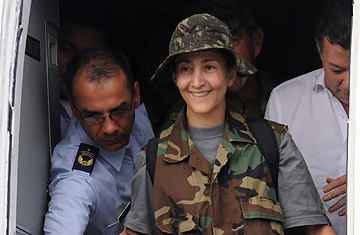
French-Colombian hostage Ingrid Betancourt prepares to get down from the plane upon her arrival at the Catam air base in Bogota on July 2, 2008.
Stansell's roundhouse provided the coup de grace in the three men's action-packed new memoir of their capture, survival and deliverance. Out of Captivity: 1,967 Days in the Colombian Jungle, published this week by William Morrow, reads like a postcard from a rain forest gulag as the authors recount forced marches, escape attempts, and encounters with snakes, tarantulas and malaria as well as meals of chicken-head soup.
In the book, and in the authors' interview this week with TIME, the men make it clear that it wasn't just jungle fare that left a bad taste in their mouths. Some of their more unpleasant memories are saved for fellow hostage Ingrid Betancourt, a French-Colombian who was kindapped while campaigning for the Colombian presidency and was rescued along with the Americans and 11 other hostages last summer. The authors describe the married Betancourt as carrying on an affair with a Colombian hostage, acting like a privileged blue-blood — "a frickin' princess" in Stansell's telling — bossing around the other prisoners and hoarding precious books, food and a transistor radio. They even claim that she told the guerrillas that the Americans were CIA agents. Asked to elaborate on Betancourt, Stansell told TIME: "That's an infection I lived with for many years. I'd just like to be inoculated and move on." Betancourt has yet to respond to the Americans' accusations.
Whether or not the Americans' criticisms are fair, a certain resentment is understandable. While Betancourt became a cause celebre in much of the world during her captivity, especially in Europe, the three U.S. military contractors were, until their rescue, little more than a tragic footnote in the U.S.-backed war on Colombia's narco-guerrillas. The Americans were kidnapped by Marxist rebels of the Colombian Revolutionary Armed Forces (FARC) on Feb. 13, 2003, after the single engine on their drug-surveillance plane conked out in southern Colombia. Not only did they crash on top of a platoon of insurgents, but they had the bad luck of being snatched just weeks before the U.S. invasion of Iraq. With all eyes on Baghdad and new war heroes like former POW Jessica Lynch, hardly anyone noticed that three Americans had gone missing in Colombia. Besides, when bad things happen to hired guns, it doesn't pack the same emotional punch of captured U.S. troops or flag-draped coffins. By the time they were rescued on July 2, 2008, Stansell, Gonsalves and Howes had endured more than five years in the Colombian jungle.
Like many hostages before them, the three gringos admit that living alongside their fellow prisoners proved almost as challenging as dealing with their prison guards. Colombian readers have been fascinated, if not irked, by their description of Betancourt, who was nominated for this year's Nobel Peace Prize and whom other freed prisoners have praised for her courageous, selfless behavior in the jungle. But as Gonsalves told TIME, achieving harmony among a diverse group of strangers can be trying even in the best of circumstances. He cited an experiment in which scientists put a bunch of rats in a small cage. "By the end, those rats are eating each other, and it's basically the same thing that happens with hostages," Gonsalves says.
Perhaps more revealing is the mens' first-hand description of the disintegration of the FARC, a 45-year-old Marxist rebel group that funds its war with the profits from drug trafficking and kidnapping. When the Americans were captured, the FARC was at its peak with about 18,000 members. Rations included beef and vegetables, rebel commandantes showed off their chrome-plated pistols and zipped around guerrilla territory in SUVs while guards led their prisoners along jungle trails singing songs with little fear of being detected. Many of the foot soldiers were illiterate teenagers who, in between battles, munched on candy and played with yo-yos and pea-shooters.
But with the help of billions in U.S. military aid, the Colombian Army has laid waste to many FARC units and squeezed their supply lines. Shortly before the Americans were rescued, their diet consisted of coffee, rice, lentils and, of all things, popcorn — the smell of which almost tipped off a team of Colombian and American Special Forces hot on their trail. Though the military offensive made life harder for the hostages, it also filled them with hope. "We were exhausted, we were starved and our supply lines were getting torn up," Howes says. "But it was a good feeling knowing that the guerrillas weren't waltzing around the countryside totally relaxed."
Shortly after their rescue, Stansell, Gonsalves and Howes met their hero, Colombian President Alvaro Uribe, who has led the offensive against the FARC and pledged to crush the rebel organization. Uribe is now considering a controversial move to change the Constitution and run for a third-consecutive term, a move that the Americans fully endorse. "He's the best president in probably 100 years," Howes says.
Back in their home country, the Americans are finding that kidnappings can be almost as hard on family members as hostages. Stansell has reunited with his Colombian girlfriend who gave birth to their twins while he was held hostage. But Gonsalves and Howes are going through divorce proceedings. ("The nightmares I have are not about captivity," Howes says. "They're about divorce.") The bonds between the three men, however, remain solid. Motorcycle buffs, they plan to criss-cross the U.S. on Harley-Davidsons in what they're calling "a freedom ride" to draw attention to hundreds of hostages still being held in the Colombian jungle.
John Otis is completing his own book about the hostage drama, Law of the Jungle, to be published this year by HarperCollins
